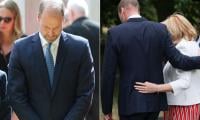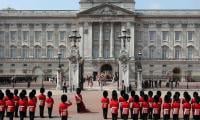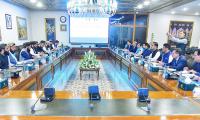ISLAMABAD: The National Security Committee (NSC) with Prime Minister Shehbaz Sharif in chair noted with concern on Monday that attacks on Iranian nuclear facilities in Fordow, Natanz, and Isfahan on June 22 violated the resolutions of the International Atomic Energy Agency (IAEA), relevant international law, and the UN Charter.
While reiterating Pakistan’s stated position under which Prime Minister Shehbaz Sharif and the Foreign Office condemned US airstrikes on Iranian nuclear sites a day earlier (Sunday), the NSC expressed grave concern over the potential for further escalation after the attacks on Iranian nuclear facilities in Fordow, Natanz, and Isfahan on June 22, which violated the resolutions of the IAEA, relevant international law, and the UN Charter.
The crucial NSC meeting was held to review the evolving regional situation following Israeli aggression against Iran. The committee strongly condemned Israel’s acts of aggression and expressed regret that these military attacks coincided with a constructive negotiation process between Iran and the United States.
These reckless actions have escalated tensions, threatening to ignite a wider conflict and diminishing the opportunities for dialogue and diplomacy.
The NSC reaffirmed Iran’s right to self-defence as enshrined in the UN Charter. The committee conveyed condolences to the government and people of Iran on loss of innocent lives and prayed for the recovery of injured.
The NSC also reaffirmed Pakistan’s close engagement with relevant parties and endorsed its readiness to further continue efforts and initiatives aimed at promoting regional peace and stability.
The NSC called on all relevant parties to resolve the conflict through dialogue and diplomacy, in line with the UN Charter. The committee underscored the need for adhering to international human rights and humanitarian laws.
Deputy Prime Minister Ishaq Dar, Federal Ministers Khawaja Asif, Azam Nazir Tarar, Attaullah Tarar, Muhammad Aurangzeb, Mohsin Naqvi, Musadik Malik, Special Assistant to Prime Minister on Foreign Affairs Tariq Fatemi, Services Chiefs, National Security Advisor, who is also the ISI chief, and federal secretaries of ministries concerned attended the meeting.
On Sunday, Pakistan condemned the strikes ordered on its neighbour Iran by Donald Trump. It said Trump’s decision to bomb Iranian nuclear facilities violated international law and that diplomacy was the only way to resolve the Iran crisis. “The unprecedented escalation of tension and violence, owing to ongoing aggression against Iran is deeply disturbing. Any further escalation of tensions will have severely damaging implications for the region and beyond,” Pakistan’s Ministry of Foreign Affairs said.
Separately, Pakistan Peoples Party (PPP) Chairman Bilawal Bhutto Zardari, in a fiery speech in the National Assembly on Monday, strongly condemned Israel’s military strikes on Iran, terming them a blatant violation of international law and a grave threat to regional peace.
He warned that continued aggression by Israel — backed by the US — could spiral into a broader conflict, dragging the world into a catastrophic war.
Citing the world’s silence on Israeli aggression against Iran, Bilawal warned that “if we don’t speak out for Iranians, there will be no one left when they come for us. Since October 2023, we have seen a genocidal, apartheid-imposing expansionist regime conducting ever expanding war which has the potential to drag us all into World War III.”
Quoting a poem written in the context of World War II, Bilawal said: “This time, first they came for the Palestinians, but the world did not speak out, because they weren’t Palestinian. Then they came for the Lebanese, but we did not speak out because we were not Lebanese. Then they came for the Yemenis, but we did not speak out, because we are not from Yemen. Now, they have come for Iran. If we do not speak out, there will be no one left when they come for us.”
He called the assault — particularly on nuclear sites in Fordow, Natanz, and Isfahan — a reckless escalation with potential cross-border consequences.
“This is not just an attack on Iran. A nuclear leak would threaten all of us, including Pakistan,” he said.
Bilawal stated that the Iranian military leadership was targeted in civilian spaces, resulting in the deaths of both personnel and innocent civilians. He noted that journalists, scientists, and media institutions had also been attacked.
He accused Israel of pushing the US into an unwanted war, stating, “The US carried out a wider assault yesterday, but the American public does not want this war. This is being forced upon them.”
He urged the government to mobilise the foreign minister to form a coalition of like-minded countries to oppose attacks on nuclear facilities and to assert that such violations cannot be tolerated.
Bilawal drew a comparison between Indian PM Narendra Modi and Israeli PM Netanyahu, calling Modi a “cheaper copy” who, according to him, had been defeated diplomatically, militarily, and in narrative terms by Pakistan. He credited Pakistan’s current leadership for revitalising the Kashmir issue internationally and resisting Indian aggression with strength, unlike the previous government which, he said, responded passively to India’s 2019 actions.
He termed India’s threats to suspend the Indus Water Treaty as illegal and warned that any move to block Pakistan’s water would provoke a strong response, potentially even war. He called for a united stance on water security and cautioned against sending weak signals internally.
Bilawal highlighted Pakistan’s growing diplomatic credibility, noting that India’s attempts to label Pakistan a terrorist state had failed. He pointed to Pakistan’s appointment to UN committees on terrorism and the Taliban, congressional praise from US officials, and even an invitation extended to Pakistan’s Army Chief by President Trump.
“Despite intense lobbying by Indian and Israeli groups, we successfully shifted the narrative in Washington and other key capitals,” he said.
Bilawal announced PPP’s conditional support for the federal budget, appreciating the inclusion of several party recommendations: 20pc increase in the defence budget, deemed necessary due to regional security threats; 20pc increase in the Benazir Income Support Programme, seen as vital for social protection; 10pc salary and 7pc pension hikes, though modest, were recognised as a gesture of support for workers.
The income tax exemption threshold for the salaried class was raised to Rs1 million, a move PPP called historic. The solar energy tax was halved from 20pc to 10pc after PPP opposition.
A 50pc cut to Sindh’s higher education budget was reversed after negotiations. Bilawal slammed the federal government’s agricultural policies and called for an agriculture emergency, citing an estimated Rs800 billion wheat loss across Pakistan. He advocated for smart irrigation and rationalised taxation instead of harmful policies driven by IMF conditionalities.
He reiterated PPP’s demand for: 30pc PSDP share for south Punjab, promised for the next budget cycle. Federal assistance for KP and Balochistan, where India is allegedly funding terrorism.
Bilawal criticised PTI for focusing exclusively on the release of its jailed leader instead of engaging in issues like terrorism, Kashmir, or agriculture. He called for constructive, policy-based opposition and urged unity on matters of national security and dignity.
Bilawal praised Prime Minister Shehbaz Sharif, Finance Minister Muhammad Aurangzeb, and Senator Ishaq Dar for incorporating PPP’s input and demonstrating political maturity. “Pakistan must project strength abroad and ensure justice at home. Peace, dignity, and unity must define our foreign and domestic policy,” he concluded.
Khyber Pakhtunkhwa Chief Minister Ali Amin Gandapur addresses an event in an undated picture. — Facebook/Ali Amin...
US President Donald Trump speaks to the media in the Press Briefing Room at the White House in Washington DC, on June...
Deputy Prime Minister and Foreign Minister Ishaq Dar gestures during a press conference. — APP/FileLAHORE/SUKKUR:...
Representational image of thermometer. —TheNews/FileISLAMABAD: A new extreme temperature record was set in Chilas,...
Iran's Supreme Leader Ayatollah Ali Khamenei speaks during a meeting in Tehran, Iran, May 20, 2025. — ReutersDUBAI:...
A person holds a bill in their hand. — KE/FileISLAMABAD: The government has collected Rs490 billion through...







